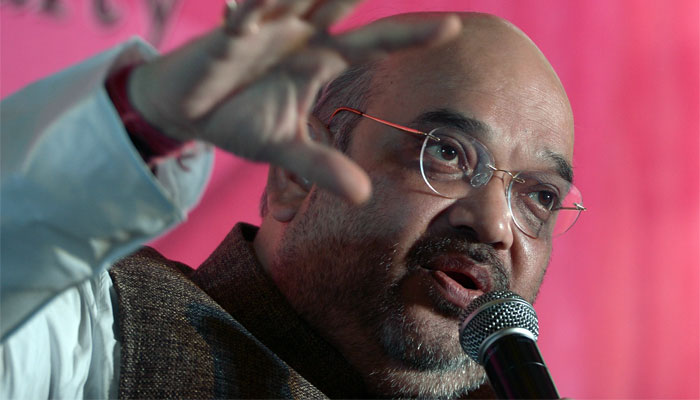Shah accused opposition parties of playing politics over his recent statement on having one language for the country which becomes India’s global identity.
“If one wants to do politics, they are free to do so. I only requested that if there is a second language being learnt it should be Hindi. I myself come from a non-Hindi state,” Shah told a news channel.
Opposition parties, particularly in southern India, had reacted sharply after Shah made the remarks on the occasion of Hindi Diwas on September 14.
On that day, Shah tweeted and reiterated at a function later in New Delhi that “India is a nation of many languages and every language has its own importance. But it is absolutely necessary to have one language for the country, which becomes India’s identity globally. If there is any one language that connects the entire nation in a common thread of unity, it is Hindi, which is spoken the maximum.”
As the controversy continued, Karnataka’s ruling Bharatiya Janata Party (BJP) said it would give primacy to Kannada.
“All official languages, including Kannada and Hindi are equal. In Karnataka, as Kannada is the principle language, we will never compromise on its importance. We are committed to promoting it (Kannada),” Chief Minister B S Yediyurappa said in a series of tweets in Kannada and English.
Leaders and cadres of the Congress and the regional Janata Dal – Secular (JD-S) staged demonstrations, held rallies in cities and towns and vowed not to allow Hindi to replace Kannada as the common or link language in the state.
“We are not against Hindi but certainly against its imposition on our people, majority of whose mother tongue is Kannada, followed by Telugu, Tamil, Malayalam and Marathi across the state,” Congress leader and former chief minister Siddaramaiah said on Sunday.
Echoing the Congress, JD-S leader and former chief minister H D Kumaraswamy said Kannada had the same status in the constitution as Hindi and dozen other languages which have their origins in Sanskrit as the mother of all Indian languages.
“Imposing Hindi as a national language in the state will be against the spirit of federalism and arbitrary in place of Kannada, which the central government has declared as a classical language over a decade ago,” Kumaraswamy tweeted in Kannada.
Federal Parliamentary Affairs Minister Pralhad Joshi, a Lok Sabha member from Dharwad in the state’s northwest region, however, said Shah’s call for making Hindi a national language was because majority of the people (45%) speak in Hindi nationwide than in other languages.
“Learning more languages, including Hindi, is good. We support all regional languages, including Kannada, Marathi, Tamil and Telugu. There is no harm in learning any language for utility and to communicate,” Joshi said.
In Chennai, Tamil Nadu’s principal opposition Dravida Munnetra Kazhagam has decided to temporarily suspend its agitation against Shah’s views, party president M K Stalin said.
Stalin told reporters after meeting Governor Banwarilal Purohit that the protest planned for tomorrow has been temporarily suspended.
The DMK leader said Purohit spoke about the proposed protest at the meeting.
“We explained to him the reasons for the protest,” Stalin said.
According to Stalin, the governor told a DMK delegation that Shah’s views were wrongly understood and assured them that Hindi will not be imposed on Tamil Nadu.
The DMK leader said Purohit had conveyed this to the DMK delegation after being told by the central government.
Meanwhile, Tamil actor Rajinikanth said a common language is important for any country for its development, growth and integrity but unfortunately such a thing cannot be brought in India.
Rajinikanth said a common language is important for any country for its development, growth and integrity.
The actor, who had said he would enter active politics, said not just Tamil Nadu, but no southern state will accept the imposition of Hindi.
Even some North Indian states will not accept Hindi imposition, he added.

